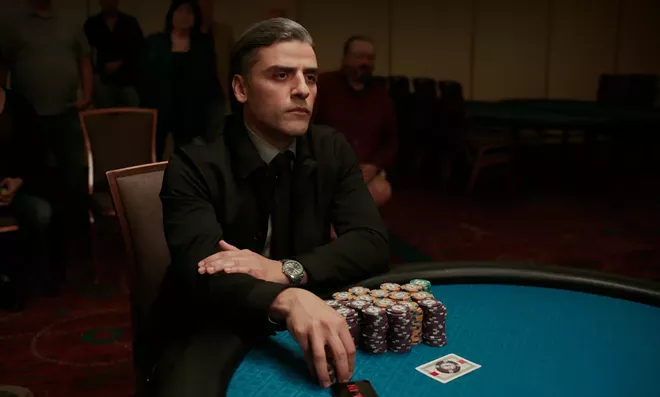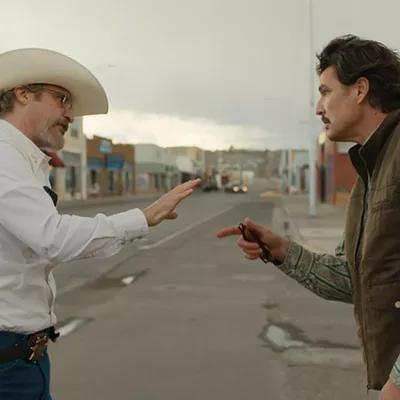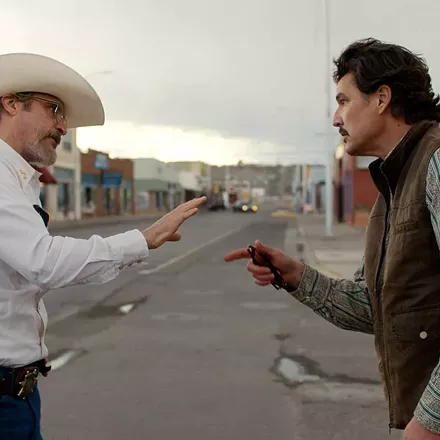The man who calls himself William Tell drifts from one regional casino to the next, winning just enough money to get by without raising the suspicions of vigilant pit bosses. The life of a gambler in Paul Schrader's The Card Counter is far from the glamour of movies like Ocean's Eleven, or even the artful sleaze of Robert Altman's California Split. It's a relentless, monotonous grind, with no more passion or excitement than working on an assembly line.
That approach to professional gambling and the network of largely interchangeable backwater casinos that sprawl across the United States could make for a fascinating movie. But, frustratingly, that's not what The Card Counter is really about. As played by Oscar Isaac, William is another of Schrader's men on the edge, barely containing their trauma and fury as they make their way through a damaged, imperfect world. He could be Pastor Ernst Toller (Ethan Hawke) in Schrader's First Reformed, or small-town cop Wade Whitehouse (Nick Nolte) in Schrader's Affliction, or even Travis Bickle (Robert De Niro) in Taxi Driver, which Schrader wrote for director Martin Scorsese.
Scorsese is credited as an executive producer on The Card Counter, and Schrader carries on the seriousness of First Reformed, which marked a comeback of sorts for him after several years in the B-movie wasteland. This is an ambitious, challenging film that fails in most of its ambitions, but is still fascinating in its missteps, as Schrader's failures usually are. As confounding as Schrader's choices can be, they're all uniquely his. And even when the writing and the filmmaking choices let him down, Isaac is consistently compelling to watch as William, delivering Schrader's overripe narration with convincing solemnity and wistfulness.
Rather than gambling, The Card Counter is mainly interested in the guilt that William carries from his time in the military, when he was one of the guards at the notorious Abu Ghraib detention center. William spent time in military prison for his actions at Abu Ghraib, and when he pops in to see a corporate lecture by his former commanding officer, Major John Gordo (Willem Dafoe), he's approached by the mysterious Cirk (Tye Sheridan), who presents him with a revenge plan against Gordo. As a civilian consultant, Gordo was never charged with any crimes, and Cirk (whose late father served alongside William and Gordo) wants to hold him accountable.
William tries to steer Cirk away from revenge, taking the young man under his wing as he makes his way through World Series of Poker qualifying events. William is bankrolled by La Linda (Tiffany Haddish), a sort of poker manager who represents various wealthy backers. Both Haddish and Sheridan seem out of place in their roles, although Cirk carries heavier emotional burdens, giving Sheridan more opportunities to stumble. The relationship between La Linda and William, both professional and eventually romantic, is slight and underdeveloped, never as powerful or passionate as Schrader seems to think it is.
The gambling scenes are mostly perfunctory, and there's never any suspense to whether William will win or lose. There's not much suspense to the revenge story, either, which culminates in multiple anticlimaxes. Maybe that proves Schrader's point about the futility of vengeance, but it makes for underwhelming drama, especially in a setting with so much high-stakes potential.
Even the visual style of the movie seems designed to drain it of any excitement or appeal. As in movies like Michael Mann's Blackhat or Steven Soderbergh's Unsane, the deliberately harsh digital cinematography draws attention to its own ugliness. For William, gambling is grim, punishing business, and Schrader takes the same approach to making this movie. ♦





















